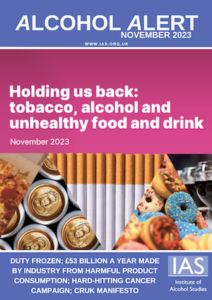In this month’s alert
Alcohol duties frozen until August 2024
Chancellor Jeremy Hunt has frozen alcohol duty until August 2024 in his Autumn Statement. He stated that: “for many people going to the pub has become more expensive” and that having listened closely to various MPs, a Councillor in his constituency, and The Sun newspaper, “I have decided to freeze all alcohol duty until 1 August next year; that means no increase in duty on beer, cider, wine or spirits.”
The Treasury estimates the cost of the alcohol duty freeze at £310m.
In the Autumn Statement publication (p.95) it states that:
“The government will freeze alcohol duties until 1 August 2024 and delay its annual uprating decision to Spring Budget 2024 to give businesses time to adapt to the duty system introduced on 1 August 2023.”
In our latest blog, we discuss the inconsistency of duty decisions and announcements, why cutting and freezing duty is bad for pubs, and that an uprating next year seems unlikely.
In Drink and Drug News, the Alcohol Health Alliance’s (AHA) Professor Sir Ian Gilmore stated that it is:
“Utterly frustrating news. Freezing duty makes alcohol cheaper to buy in real terms. We know that the cheaper alcohol is, the more is consumed, and the more damage done. Cheap alcohol has unquestionably played a part in the record number of alcohol-related deaths and hospital admissions we are now experiencing. Reintroducing the alcohol duty escalator from 2008 to 2014 – which increased duty by 2 per cent above inflation each year – would save lives, help hospitality, and contribute to Treasury revenue.”
Alcohol Change UK’s Dr Richard Piper said it was “astonishing” that the government had frozen alcohol duty again, calling it “a tax cut for wealthy alcohol producers”:
“Alcohol harm costs all of us taxpayers around £21bn per year and it’s not acceptable that the government is failing to recoup this cost from those who profit from alcohol harm. We need the government to urgently reconsider this decision and remove the freeze on alcohol duty. With alcohol liver deaths rapidly rising, with no signs of that falling back, we desperately need bold action from the government to stop more lives being needlessly lost.
A YouGov survey for The Times found that the freeze was the least popular decision made in the Statement among the public, with only 38% of people supporting the decision and 47% saying it is the wrong priority for the country at the present time.
Commenting on the poll, Interim Director of the Social Market Foundation Dr Aveek Bhattacharya, said:
Emma McClarkin, chief executive of the British Beer and Pub Association, welcomed the freeze along with an extension of business rates relief for pubs, saying the measures would be worth £350m to the sector. But she warned that increases to the National Living Wage would add costs of £240m to pubs “at a time when we are struggling to not pass on costs to the consumer”:
“The pub needs to remain affordable for all and we remain open to working with the government to ensure our pubs and brewers have the support they need to keep investing in people and places and providing much needed boost to local economies.”
The Wine and Spirit Trade Association (WSTA) chief executive Miles Beale also welcomed the freeze in alcohol duty, saying it came as “a huge relief” to a sector that had “taken a battering” in recent years. The Daily Mail quoted Beale as saying:
“We implore the Chancellor and his team to lock in the freeze until at least the end of this Parliament. This will keep people in jobs and mean consumers will still be able to enjoy a drink at a price they can afford.”
In The Sun, Diageo GB boss Nuno Teles said:
“Today we raise a glass to the Chancellor and the Prime Minister. They have listened to the industry’s plea for support and decided to back our homegrown sector, that employs so many people across the UK.”
GB News argued that some landlords have voiced concern about freezing duty, with one saying:
“To be honest, freezing duties won’t save any money at all. The only thing that will help us at all is a VAT reduction. Freezing duties will save pennies. It goes through so many hands before it gets to us. I know that sounds pessimistic but that’s the reality of it.”
Another labelled Hunt’s announcement “rubbish” and argued the government is only interested in big business.
Delay to 2022’s alcohol-specific death data
Alcohol-specific death data is usually published by the Office for National Statistics in early December. This year, the 2022 data release will be delayed until January or February 2024, due to a delay in the release of data on population estimates. A date hasn’t been confirmed but the release calendar will show it when finalised.
This is also why the Local Alcohol Profiles for England will be delayed too. They will be published on 06 February.
Alcohol, tobacco, and junk food industries make £53 billion a year from harmful consumption – podcast feature
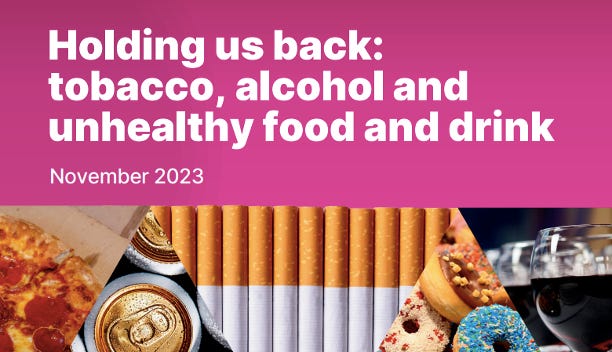
A new report by the AHA, Action on Smoking and Health (ASH), and the Obesity Health Alliance (OHA) has found that harmful consumption of alcohol, tobacco, and junk food makes these industries £53 billion every year. The report was first covered in The Guardian.
The health charities have urged a crackdown on industries profiting from risky consumption and said that the government’s failure to regulate is part of the reason why harm from these products costs the UK economy £31 billion in lost productivity.
The group stated that:
“Big businesses are currently profiting from ill-health caused by smoking, drinking alcohol and eating unhealthy foods, while the public pay the price in poor health, higher taxes and an under-performing economy.”
Professor Sir Ian Gilmore said that:
“As funding to public sector services dwindle, the industries peddling these harmful products line their pockets with billions in revenue. It’s time that the government puts the health of our nation before the profits of industry.”
The coalition is calling on government to put in place a comprehensive strategy to prevent ill-health from commercially driven risk factors, and redress the balance between industry influence and the public’s health.
Recommendations in the report include:
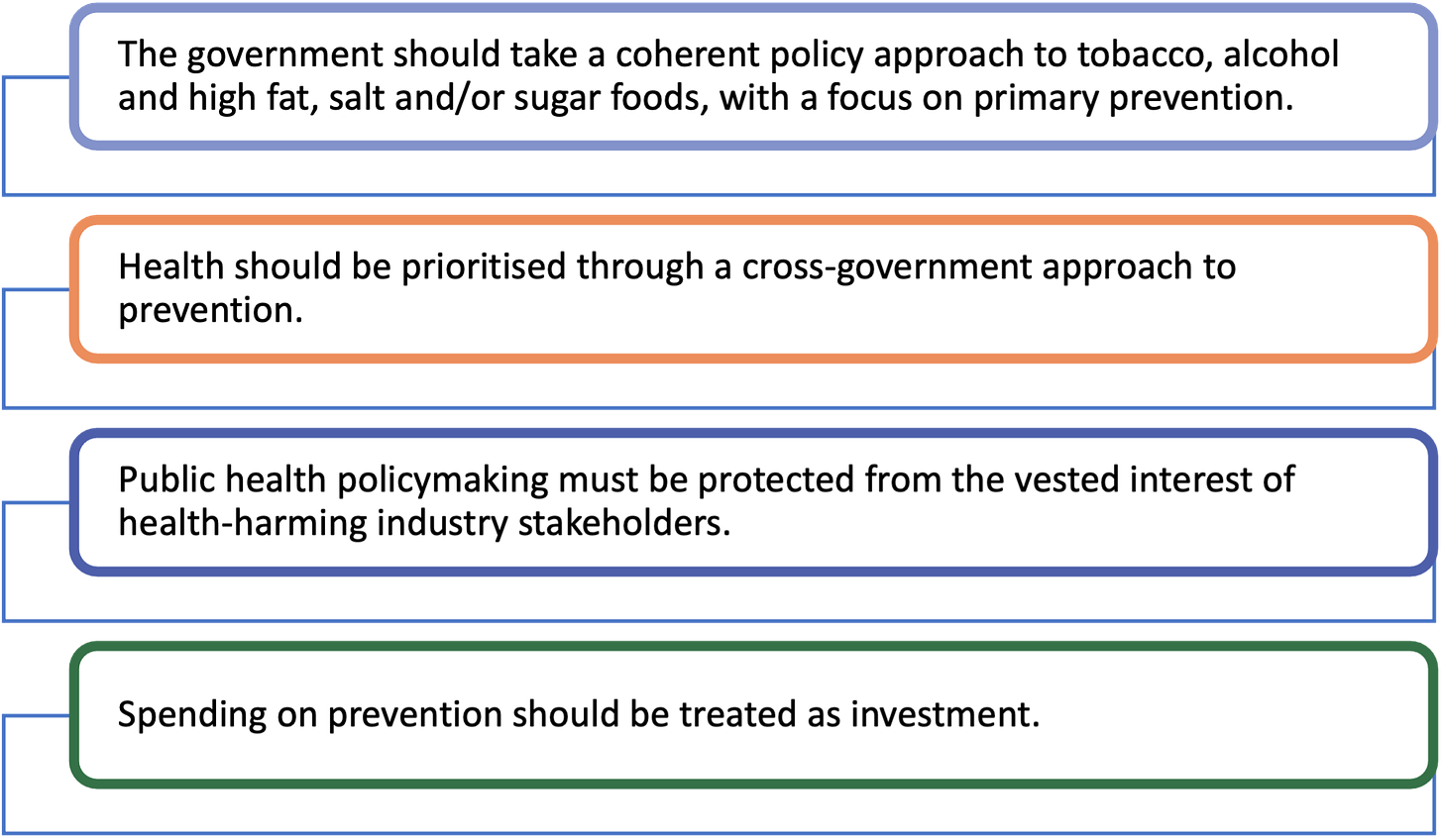
In The Times’ coverage of the report, Director of Public Health Alice Wiseman said:
“The government must learn from the lessons of tobacco control and regulate all harmful products so that our society promotes good health, instead of constantly pushing us to consume products that actively harm our health.”
The Daily Mail’s coverage focused on the number of people unemployed due to the consequences of ill health from these products, with 459,000 unable to work.
Professor Gilmore added:
“We know that people want the opportunity to lead healthy lives and make healthy choices. But the current lack of legislation around these harmful products makes it difficult when industry invests millions of pounds into strategies to coerce us into consuming them.”
In our podcast, report author Dr Aalaa Jawad discussed the findings and implications, including why public support for prevention policies often doesn’t translate into policy change.
Hard-hitting campaign in the North East highlights alcohol as a carcinogen – podcast feature
Balance North East, an organisation that seeks to reduce alcohol harm in the region, has launched a powerful new campaign called ‘Alcohol is Toxic’ to raise awareness of how alcohol causes cancer.
The campaign trailer features a man consuming alcohol and tracks the liquid down his body, to highlight how it physiologically affects the body, and ends with the man in hospital having been diagnosed with cancer.
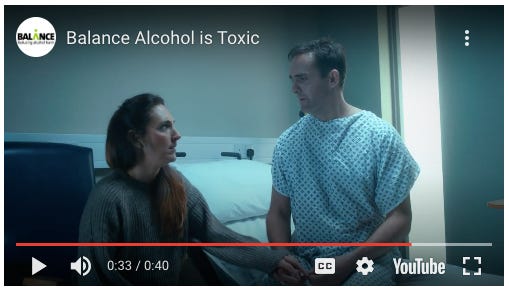
People are being encouraged to go to www.reducemyrisk.tv to find free advice and tools to cut down, and for links to local alcohol support services.
The campaign has been launched after new figures reveal that nearly 500 people in the North East die from alcohol-related cancers each year.
In our podcast we spoke to Balance’s Head of Alcohol Policy Susan Taylor, who highlighted that due to similar awareness campaigns that the charity has run each year, people living in the region have higher awareness of alcohol as a cause of cancer:
“We know already that our rates of awareness are much higher than the rest of the country when it comes to that understanding of the links between alcohol and cancer, we’re at around a third compared to about 10% of the rest of the country.”
Taylor also discussed how government action is lacking in tackling alcohol harm and how it needs to take the huge evidence base seriously.
Cancer Research UK demands action on cancer prevention and research
The world’s leading cancer charity has launched a programme for government and manifesto for cancer research and care, to encourage the government to take a more ambitious and evidence-based approach to reduce cancer cases and deaths in the UK.
Chief Executive Michelle Mitchell said:
“The burden of cancer will grow significantly over the coming years. Our projections suggest that by 2040, the UK will see around half a million new cases diagnosed each year. The UK must put measures in place now so that we’re ready.”
In the wide-ranging programme, the charity sets out its prevention agenda, which it says is “ready for the UK government” and includes tackling cancers caused by tobacco, alcohol, and unhealthy foods. The report finds that:
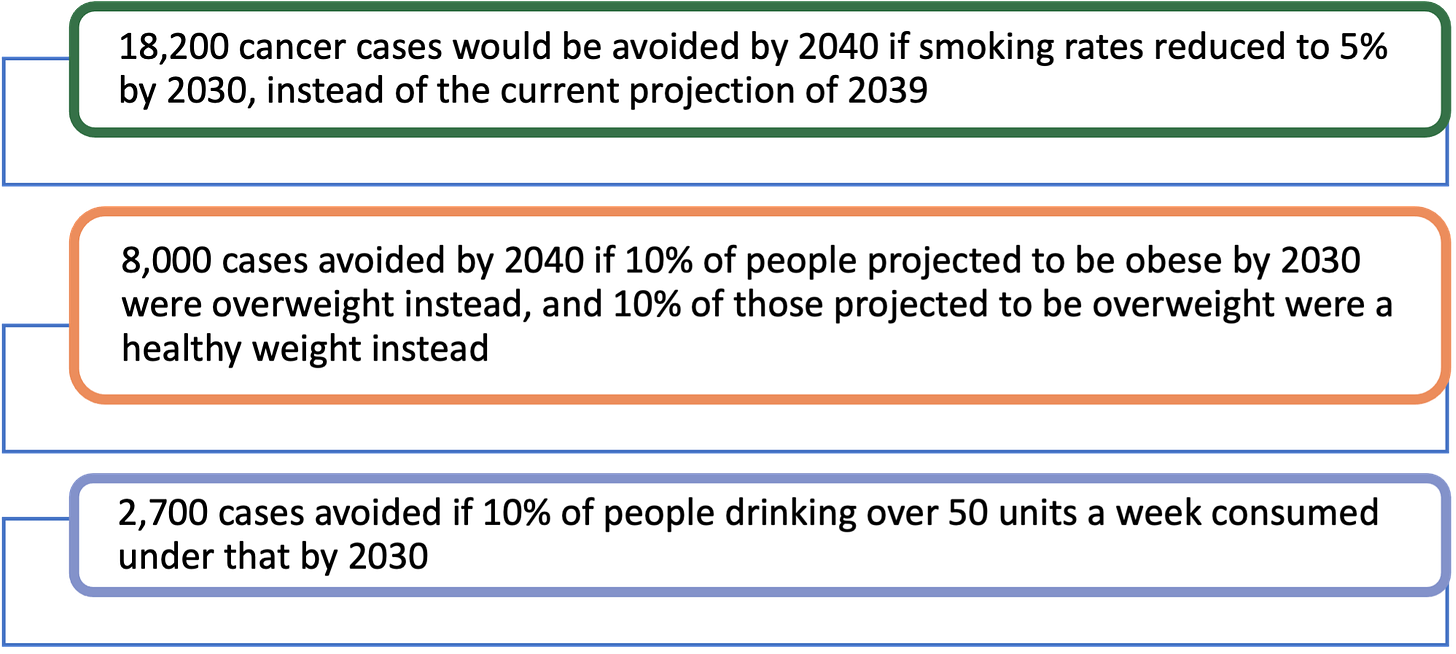
The charity endorses the prevention policies of the AHA, OHA, and ASH. Regarding alcohol, the programme specifically calls for restrictions on alcohol marketing:
“The UK government should introduce restrictions on alcohol marketing to protect children and vulnerable people.”
It also highlights the success of minimum unit pricing in Scotland.
Highlighting the economic benefit of reducing avoidable cancer cases, the programme states that:
“If the UK government successfully reduces the prevalence of smoking, overweight and obesity, and drinking alcohol above recommended limits to prevent 29,000 cancer cases in total by 2040, it could save around £720m in health and informal care costs for cancer and lead to around £773m more in productivity gain.”
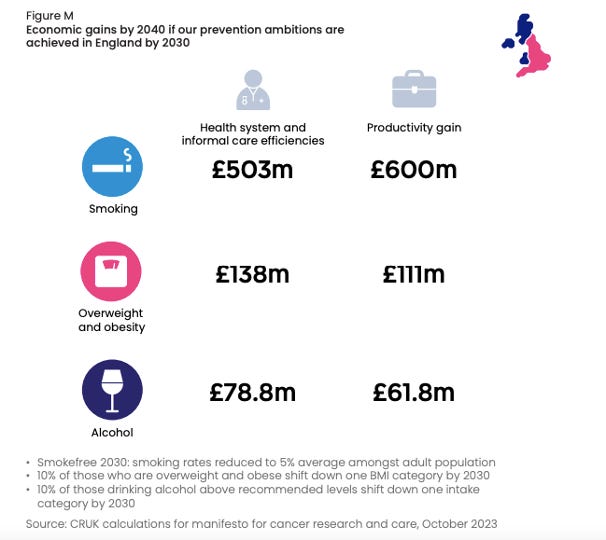
Alcohol consumption in Ireland falls and advertising restrictions confirmed
In Irish news, the Healthy Ireland Survey has revealed a 5 percentage point decrease in alcohol consumption over the past five years, with 70% of the population reporting consuming alcohol in the previous 12 months.
Alcohol Action Ireland said the findings highlight the impact of the Public Health Alcohol Act. The Act includes introducing minimum pricing, restricting advertising, reducing the visibility of alcohol in shops, and adding warning labels to products. These will be implemented in phases.
However, the survey also found that heavy episodic drinking remains prevalent, especially among young adults and parents.
Heavy episodic drinking by age and sex (%)
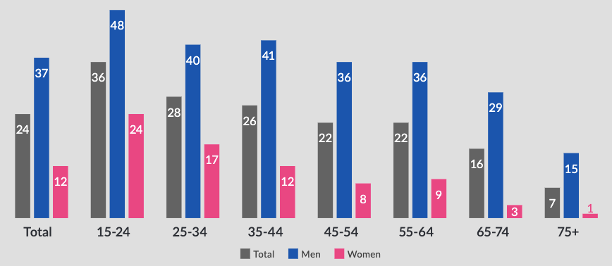
In addition, those aged 15-24 were the group most likely to have consumed alcohol. Five years ago, they were one of the least likely groups.
In mid-November, Ireland’s Department of Health confirmed a new alcohol advertising watershed, starting January 2025, banning daytime TV and radio ads for beers, wines, and spirits.
The move aims to limit children and young people’s exposure to alcohol ads, citing evidence that such advertising increases the likelihood of underage drinking.
The law prohibits alcohol advertising during the day and restricts it to specific evening hours. Violators may face legal consequences.
Health experts call for a reduction in the drink driving limit
As part of Road Safety Week, there were a number of articles on the drink driving limit and debate around whether the limit should be reduced.
The current limit in England, Wales and Northern Ireland is 80 milligrams of alcohol per 100 millilitres of blood. Malta is the only other European country to have a limit this high, with Scotland and much of Europe setting a level of 50 milligrams (and some even lower).
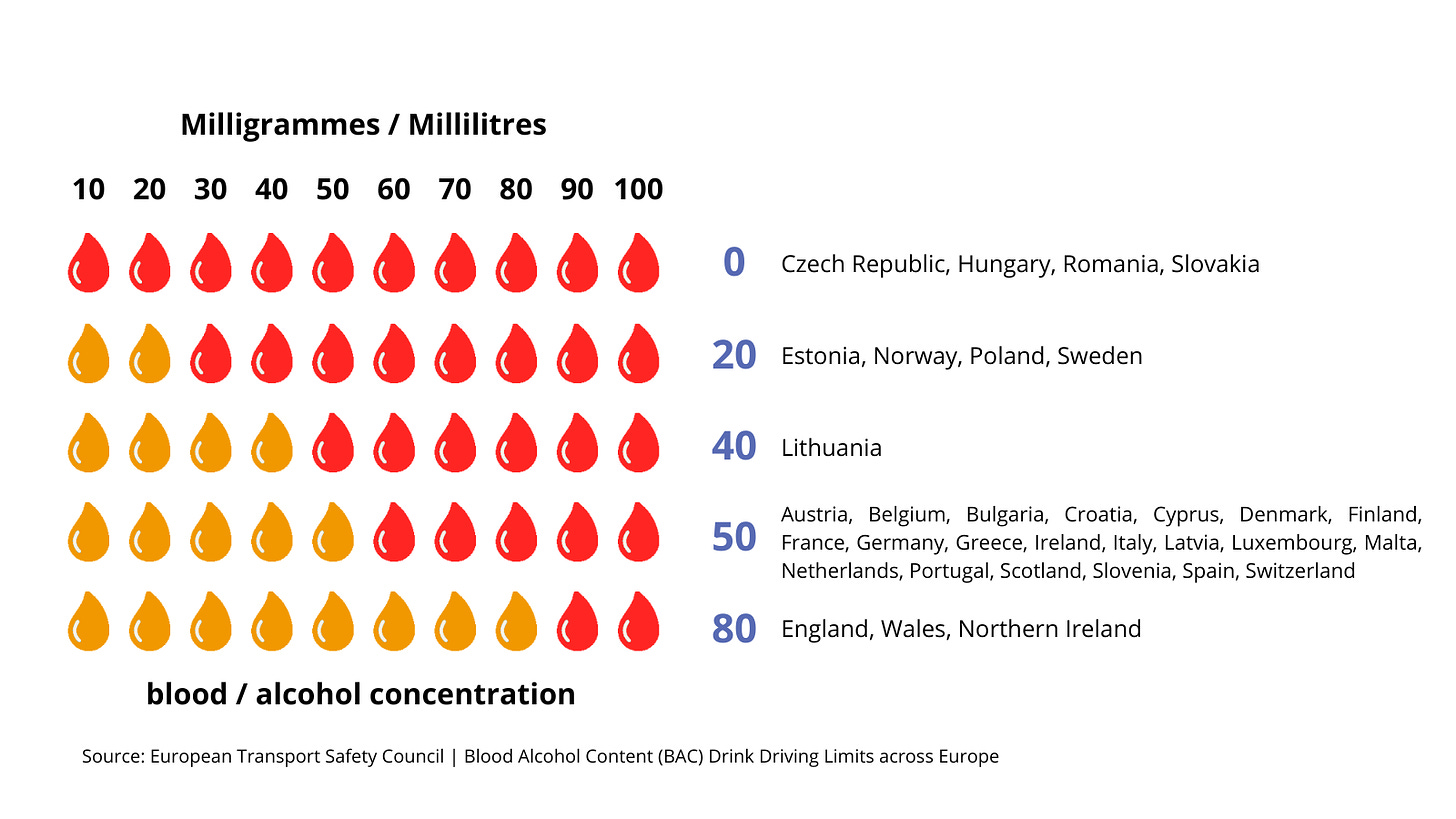
The British Medical Association (BMA) is calling on the government to reduce the limit. Professor Sir Ian Gilmore, who is the President of the BMA, pointed out that public awareness of what constitutes a unit of alcohol is low, and that bigger measures and stronger drinks sold in pubs have effectively blurred the boundary on units consumed:
“People are just not aware. To talk about how many units you can have is not helpful. That idea you could have two pints and four units and get away with it has always been dangerous. The risks are so high and the consequences are so big.
“The level to which we reduce it is I think up for debate. My preference is to go down to 20 milligrams. It allows for almost zero-tolerance but takes account of a pretty strong aftershave that morning.”
This would match the limit in the Czech Republic, Hungary, Romania, and Slovakia.
Dr Katherine Severi, chief executive at the Institute of Alcohol Studies, said:
“We know that many alcoholic products have increased in strength over the years. But people’s understanding of the limit and the number of units in a drink is often quite low, with many thinking that it’s ok to have two drinks before driving. The safest approach is also the simplest: don’t drink alcohol before driving.
“We support the BMA’s sensible call for the UK to reduce its drink driving limit to match most countries in Europe. Drivers within the current legal limit are six times more likely to be involved in a fatal crash, compared to those who haven’t consumed alcohol. With more than three quarters of people supporting reducing the drink driving limit, the government cannot ignore the evidence and ignore what every other country is doing.”
Watering down the EU’s Beating Cancer plan and French minimum pricing
The World Health Organisation (WHO) has expressed concerns over “scientifically inaccurate and worrisome” wording related to alcohol use in the European Union’s Beating Cancer plan.
The WHO sent a letter to lawmakers in the European Parliament’s Environment Committee, warning that the industry is influencing the plan to only focus on “harmful use of alcohol”.
The WHO letter stated that:
“The terminology of ‘moderate and responsible drinking information’ or ‘harmful consumption of alcohol’ is scientifically inaccurate and worrisome in the context of cancer prevention.”
Health warning labels on alcohol products were omitted from the compromise amendments. And references to alcohol consumption as a factor in substantially increasing the risk of NCDs were removed.
The WHO and the International Agency for Research on Cancer called for the clear recognition of alcohol’s contribution to cancer incidence and mortality without misleading qualifiers.
Organisations and civil society groups have also called for the rejection of these amendments.
French MUP
In France a cross-party group of senators are calling for a minimum price of alcohol policy, following Scotland’s successful policy.
The Times says that the group want the government’s finance bill to be amended to introduce a 50 cents per unit price, which would mean a bottle of 12% ABV wine could not be sold for less than €4.50.
Véronique Guillotin, deputy chairwoman of the Senate’s social affairs committee, said the policy would reduce alcohol consumption and that the country was in a “dramatic situation in public health terms”, with around 42,000 deaths from alcohol each year.
The article states that thousands of winemakers have protested over falling incomes in southern France, and that they say a minimum price would lead to a fall in sales.
President Macron’s cabinet has not yet responded to the amendment.
OECD report suggests Brits are some of the heaviest drinkers
In early November there was a lot of UK media focus on a report by the Organisation for Economic Co-operation and Development (OECD), due to the report highlighting the prevalence of heavy episodic drinking in the UK.
Media outlets specifically focused on the OECD stating that British women are the most frequent heavy episodic drinkers across OECD countries.
However, a debate emerged about the comparisons due to countries not calculating drinks in the same ways and therefore not being easily comparable. Professor John Holmes of the University of Sheffield explains these concerns:
The report urged ministers to adopt stricter policies to target heavy drinkers, including minimum unit pricing for alcohol, and the introduction of warning labels, as well as advertising restrictions to prevent the promotion of alcoholic drinks.
Dr Katherine Severi called for a national alcohol strategy and minimum unit prices to reduce heavy drinking:
“It’s concerning to see that men and women in the UK are more likely to drink heavily than in other developed countries… Alcohol is the leading risk factor for death and ill-health in people aged 15-49 due to its links with cancers, stroke and cardiovascular disease. This not only shatters families but places a huge financial burden on the NHS and wider economy.”
The Independent focused on the report’s findings that the UK spends more on healthcare than comparable countries but has fewer hospital beds, diagnostic tools and pays nurses less.
Alcohol Toolkit Study: update
The monthly data collected is from English households and began in March 2014. Each month involves a new representative sample of approximately 1,700 adults aged 16 and over.
See more data on the project website here.
Prevalence of increasing and higher risk drinking (AUDIT-C)
Increasing and higher risk drinking defined as those scoring >4 AUDIT-C. A-C1: Professional to clerical occupation C2-E: Manual occupation
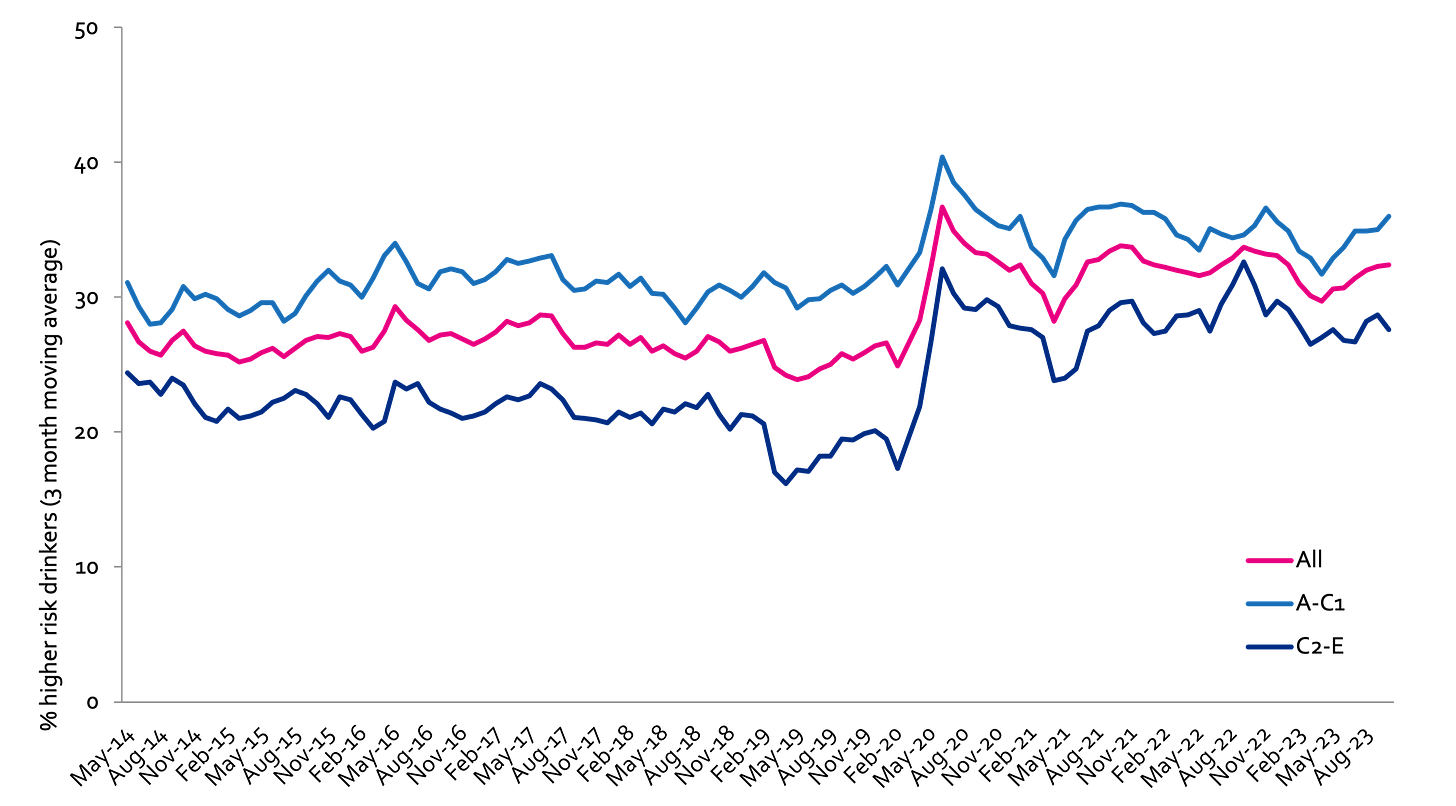
Currently trying to restrict consumption
A-C1: Professional to clerical occupation C2-E: Manual occupation; Question: Are you currently trying to restrict your alcohol consumption e.g. by drinking less, choosing lower strength alcohol or using smaller glasses? Are you currently trying to restrict your alcohol consumption e.g. by drinking less, choosing lower strength alcohol or using smaller glasses?
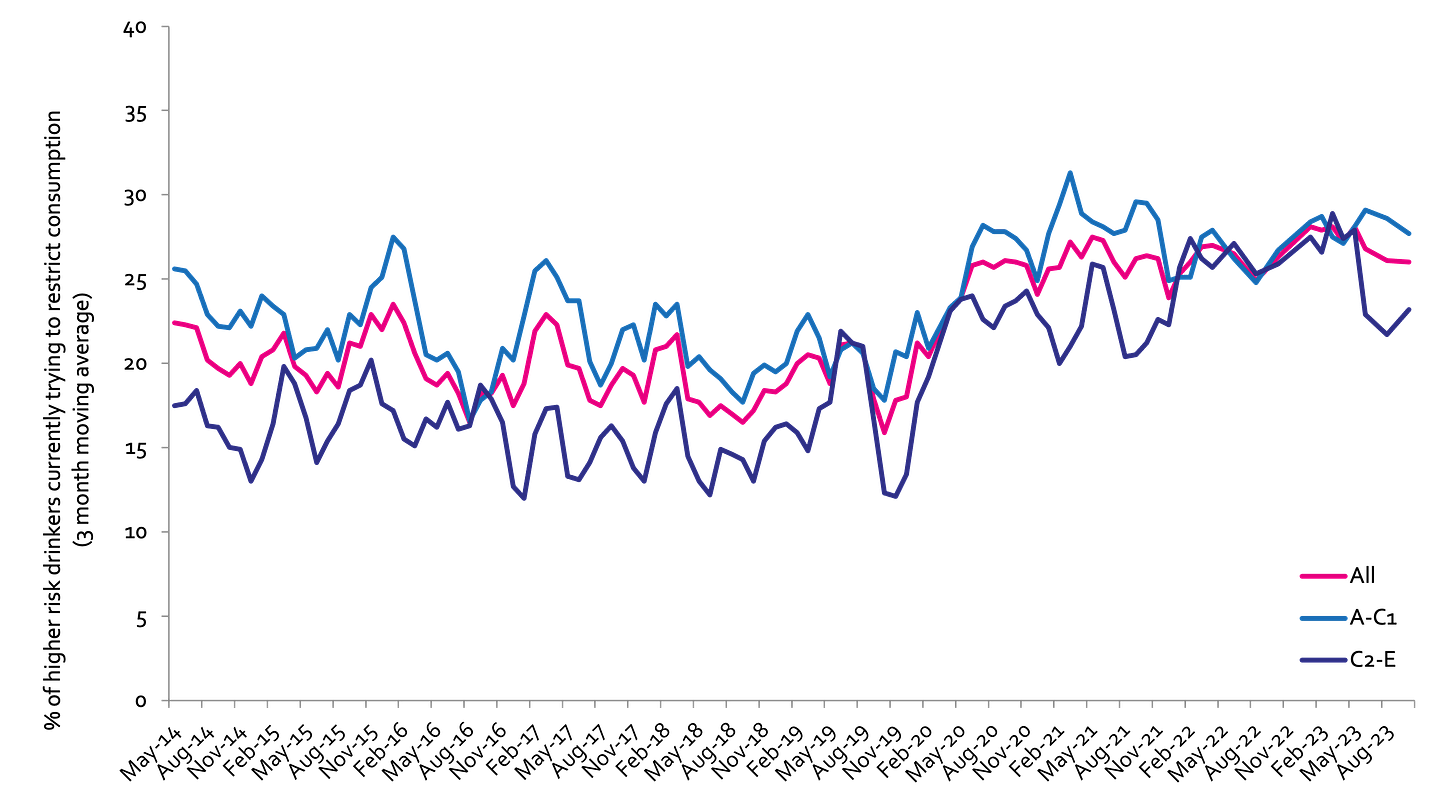
Serious past-year attempts to cut down or stop
Question 1: How many attempts to restrict your alcohol consumption have you made in the last 12 months (e.g. by drinking less, choosing lower strength alcohol or using smaller glasses)? Please include all attempts you have made in the last 12 months, whether or not they were successful, AND any attempt that you are currently making. Q2: During your most recent attempt to restrict your alcohol consumption, was it a serious attempt to cut down on your drinking permanently? A-C1: Professional to clerical occupation C2-E: Manual occupation
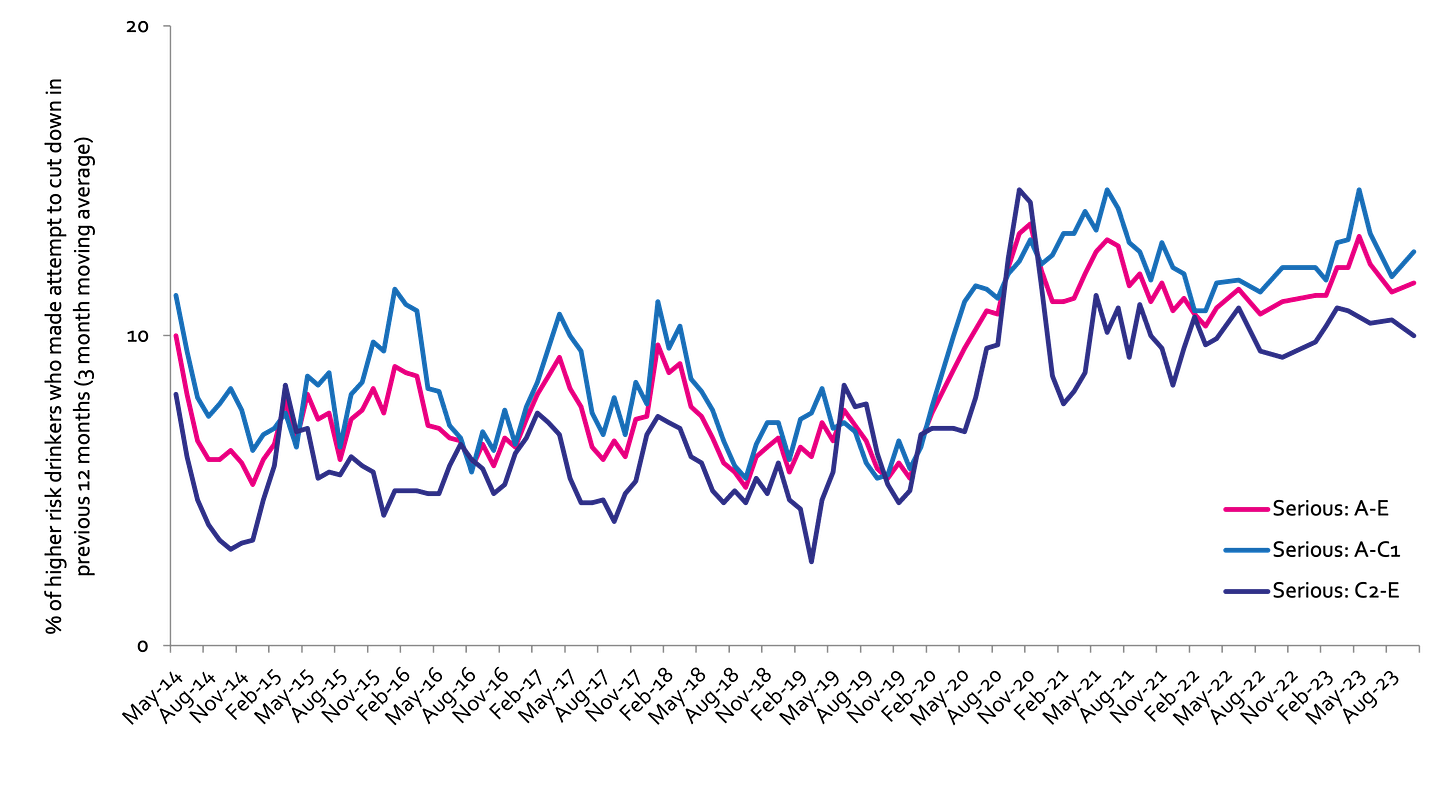
Podcast
Our monthly podcast features interviews with experts from across the sector.
Gambling industry harms and parallels with the alcohol world
Will Prochaska –
Coalition to End Gambling Ads

